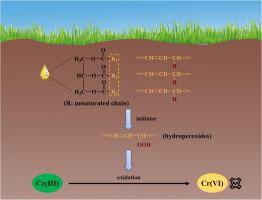Journal of Hazardous Materials ( IF 13.6 ) Pub Date : 2020-11-28 , DOI: 10.1016/j.jhazmat.2020.124699 Teng Xu , Xiaofeng Jiang , Yuling Tang , Yunhang Zeng , Wenhua Zhang , Bi Shi

|
The kinetics and mechanisms of the oxidation of Cr(III) in soil contaminated by unsaturated oils were investigated. Batch experiments were performed with unsaturated oils, namely, fish oil, hydrogenated lard oil, rapeseed oil, and caster oil. Impacts of environmental parameters, including temperature, soil pH, UV irradiation, oil content, and soil moisture content were examined. Results showed that oxidation of Cr(III) in oil-treated soils was accompanied by the formation of Cr(VI), which first increased and then decreased. Changes in the peroxide values of oils and the production of hexanal in the soil indicated that hydroperoxide was closely related to the formation of Cr(VI). tert-Butylhydroperoxide, as a model molecule of hydroperoxide, significantly enhanced the oxidation of Cr(III) in water. This result further showed that hydroperoxides were responsible for the oxidation of Cr(III). Native soil substances, such as organic matter, Fe(II), and microbes, and the decomposition products of hydroperoxides, such as aldehydes, could reduce Cr(VI). The change in Cr(VI) content in the soil resulted from the competition between the oxidation of Cr(III) and the reduction of Cr(VI). High temperature, high soil pH, UV irradiation, and low soil moisture content could facilitate the oxidation of Cr(III), which is of environmental significance.
中文翻译:

不饱和油诱导的三价铬的氧化:土壤中六价铬形成的途径
研究了不饱和油污染土壤中Cr(III)氧化的动力学和机理。使用不饱和油,即鱼油,氢化猪油,菜籽油和蓖麻油进行了批量实验。研究了环境参数的影响,包括温度,土壤pH值,紫外线辐射,油含量和土壤水分含量。结果表明,在经过油处理的土壤中,Cr(III)的氧化伴随着Cr(VI)的形成,其先升高后降低。土壤中油的过氧化物值的变化和己醛的产生表明氢过氧化物与Cr(VI)的形成密切相关。叔-氢过氧化物的丁基分子作为氢过氧化物的模型分子,显着增强了水中Cr(III)的氧化。该结果进一步表明氢过氧化物是造成Cr(III)氧化的原因。天然土壤物质(例如有机物,Fe(II)和微生物)以及氢过氧化物的分解产物(例如醛)可以还原Cr(VI)。土壤中Cr(VI)含量的变化是由于Cr(III)的氧化与Cr(VI)的还原之间的竞争所致。高温,高土壤pH值,紫外线辐射和低土壤水分含量可促进Cr(III)的氧化,这对环境具有重要意义。



























 京公网安备 11010802027423号
京公网安备 11010802027423号